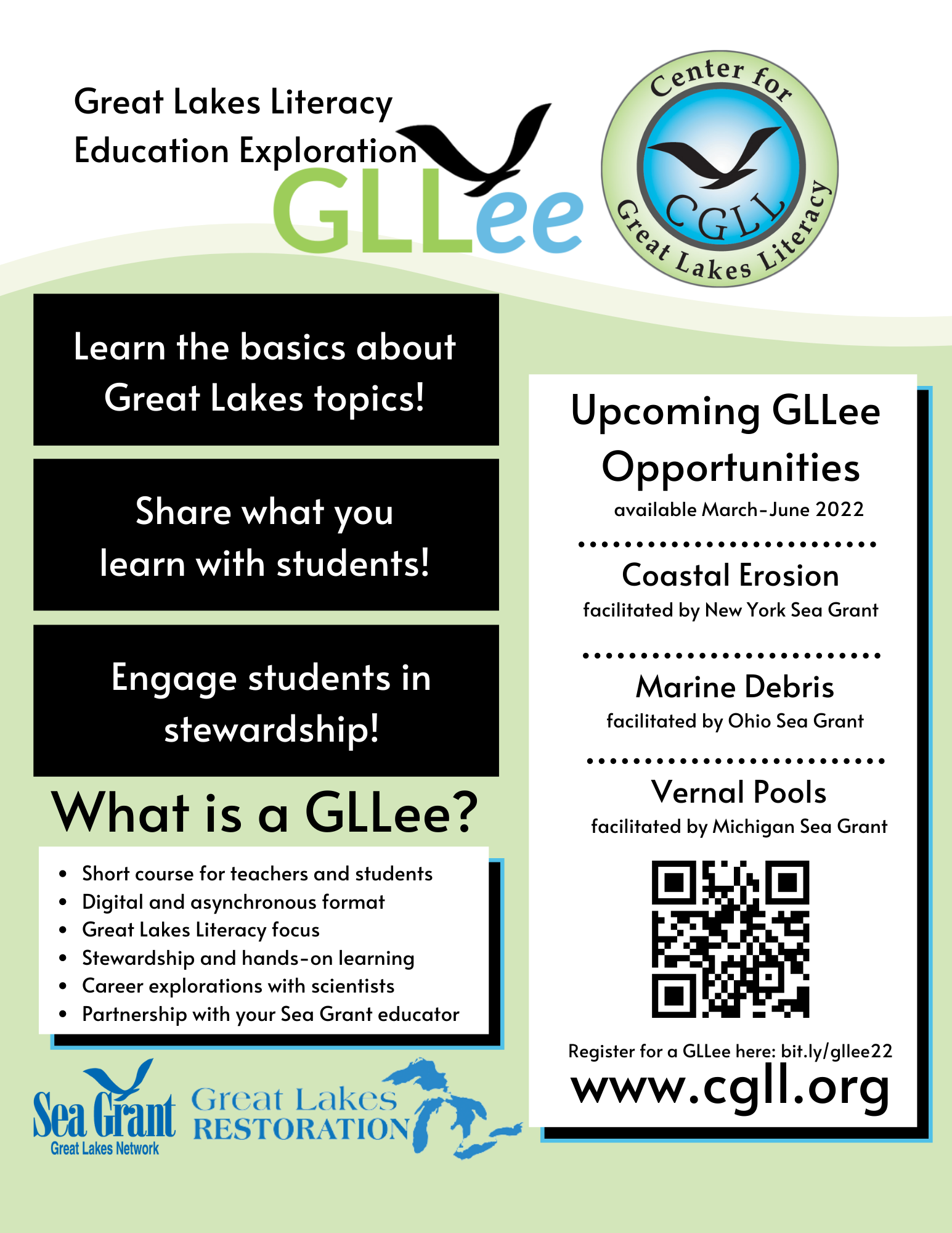Great Lakes Literacy Education Exploration – free, on-demand learning modules for teachers and students
GLLee opportunities offer a way to engage youth in experiential learning with a focus on our amazing Great Lakes.

Teachers, are you looking for simple ways to introduce youth to Great Lakes topics and hands-on learning opportunities? Check out the free Great Lakes Literacy education exploration opportunities — available virtually and asynchronously — through the Center for Great Lakes Literacy (CGLL).
Great Lakes Literacy education exploration (GLLee) opportunities offer introductory professional learning (with educator contact hours) for formal and informal educators hoping to get their feet wet with Great Lakes Literacy while engaging youth in Great Lakes learning experiences and stewardship opportunities.
As easy as 1-2-3
GLLee uses a module format, and each module provides a complete package of learning and engagement resources on a Great Lakes topic or issue. Participation is as easy as 1-2-3.
- Explore Great Lakes topics with scientists and experts who introduce educators and students to each subject or issue (and their related career) through video;
- Get support with access to curated, exemplary resources and learning materials for both students and teachers; and
- Engage students using highlighted examples of student activities and place-based stewardship education opportunities — a launching pad to pathways and partners where learners can dive more deeply into each issue or topic.

Register online
Learn more and register online for the GLLee opportunities. Current topics available to educators during the 2021-2022 school year (through June 30, 2022) include:
- Coastal Erosion (Best suited for students in grades 6-12)
- What? Coastal erosion is the process by which strong wave action and coastal flooding wear down or carry away rocks, soils, and sands along the coast.
- Driving question? How does coastal erosion shape the shorelines of the Great Lakes and impact our ecosystems and communities?
- Marine Debris (Best suited for students in grades 4-12)
- What? Marine debris is any human-made material that can end up - on purpose or by accident - in our rivers, ocean, and Great Lakes.
- Driving question? How does marine debris impact our Great Lakes and animals (including humans) and plants that depend on this freshwater resource?
- Vernal Pools (Best suited for students in grades 6-12)
- What? Vernal pools are "wicked big puddles" and ecologically serve as the "coral reefs of our northern forest ecosystems."
- Driving question? How do vernal pools (seasonal woodland wetlands) benefit the Great Lakes region?
As a collection of different topic modules, learners can choose to participate in any or all topics of interest, perhaps even growing their digital library of learning over time. The modules offer a great opportunity to introduce new teachers to Great Lakes education partners, projects, and resources; and veteran educators a chance to expand their content knowledge and capacity through exploration of new Great Lakes topics. All participating educators can directly engage their students, as part of each session, in Great Lakes literacy and learning. Please contact admin@cgll.education for any questions or accessibility concerns.
About our team
The Center for Great Lakes Literacy (CGLL), a Sea Grant-led network and partnership, promotes Great Lakes literacy among an engaged community of educators, scientists, residents, and students by encouraging hands-on experiences and basin-wide stewardship; and providing educational resources and networking opportunities. This GLLee opportunity is supported by CGLL with funding from the Great Lakes Restoration Initiative (GLRI) and National Oceanic and Atmospheric Administration (NOAA).
Michigan Sea Grant helps to foster economic growth and protect Michigan’s coastal, Great Lakes resources through education, research and outreach. A collaborative effort of the University of Michigan and Michigan State University and its MSU Extension, Michigan Sea Grant is part of the NOAA-National Sea Grant network of 34 university-based programs.
This article was prepared by Michigan Sea Grant under award NA180AR4170102 from the National Oceanic and Atmospheric Administration, U.S. Department of Commerce through the Regents of the University of Michigan. The statement, findings, conclusions, and recommendations are those of the author(s) and do not necessarily reflect the views of the National Oceanic and Atmospheric Administration, the Department of Commerce, or the Regents of the University of Michigan.



 Print
Print Email
Email

